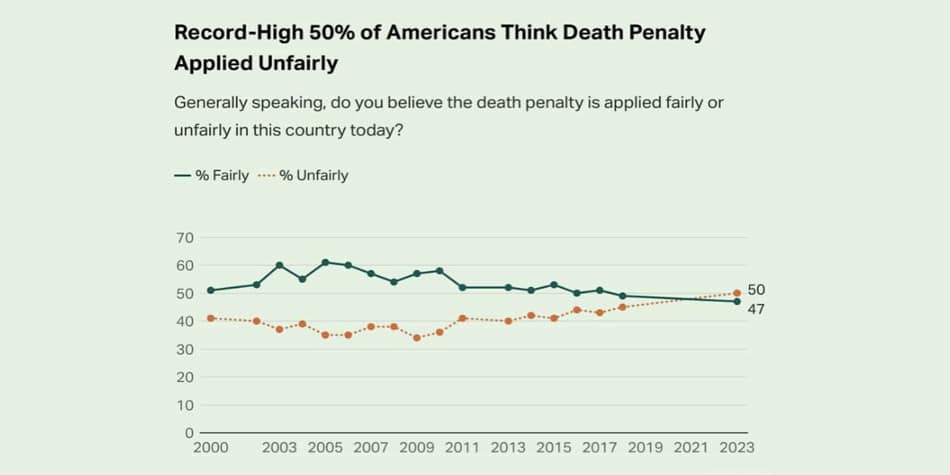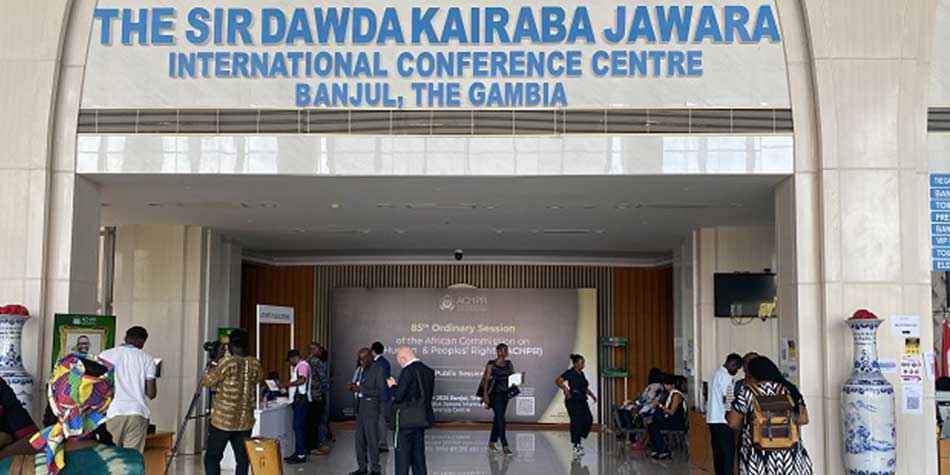
The unprecedent shift in attitudes towards abolition in the US
Statistics
The Death Penalty Information Center’s 2023 report highlights a rising trend towards abolition in the US, evidenced by a decrease in states conducting executions and heightened backing for individuals asserting innocence. In 2023, the United States witnessed 24 executions, 21 death sentences, and three exonerations, reflecting this evolving trend.
Ongoing shift towards Abolition
Public opinion in the US is increasingly leaning towards skepticism the fair application of the death penalty. After the Gallup Crime Survey has asked for opinions about the fairness of the death penalty application, the results show that more Americans believe the Death penalty is applied unfairly (50%) than fairly (47%). The survey affirms that (53%) of Americans favor the death penalty which represents the lowest number since March 1972. Results from 2019 indicate that support for the death penalty drops even lower (36%) when respondents are given the option of life without parole. 2023 also represents the 9th consecutive year with fewer than 30 people executed and fewer than 50 people sentenced to death. This marks a notable departure from historical execution rates.
John Huffington, Jesse Johnson, and Glynn Simmons were exonerated in 2023 after a cumulative 109 years of wrongful imprisonment. John Huffington was granted a full pardon based on conclusive evidence of innocence, leading to his release. Similarly, Jesse Johnson was released in Oregon due to ineffective representation and the unavailability of critical evidence. Glynn Simmons, sentenced to death in Oklahoma, was exonerated after 48 years when prosecutors failed to disclose exculpatory evidence. Despite their release, these cases underscore systemic flaws within the criminal justice system.
Most Executed Prisoners Would Likely Not Be Sentenced to Death Today
Executed prisoners spent an average of nearly 23 years on death row, the longest duration in the modern era. This prolonged incarceration has been associated with negative mental health impacts, as many prisoners on death row experience worsening mental health conditions. Significant changes in legal frameworks and societal understanding suggest that many of those executed would not have received the death penalty under current circumstances including the introduction of life without parole as an alternative sentence, and advancements in understanding mental health and trauma which has significantly strengthened the case for alternative sentencing over the years. Furthermore, high Profile innocence cases received intense media attention but found no relief in the courts. Innocence cases dominated much of the media’s attention on death penalty cases in 2023, however in the past decade, only 15 clemencies have been granted. In Florida for instance, the Supreme Court denied petitions questioning the fairness of the clemency process, resulting in the executions of Darryl Barwick and Michael Zack shedding light onto challenges in accessing clemency and revealing flaws within the legal system when safeguarding innocent individuals.
In August 2023, Alabama unveiled new execution method using nitrogen suffocation. Alabama officials sought the Supreme Court approval to set an execution date for Kenneth Smith, who survived an earlier, botched attempt to execute him in 2022. These developments intensified debates over the cruel treatment of those facing execution. Legal battles erupted, challenging the morality and constitutionality of these approaches. Read the full report here.







